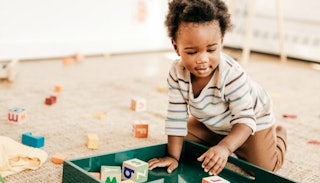The Importance Of Being Spontaneous With Our Kids

I sat quietly in a plastic chair across the room from my son. His speech therapist, aka The Picture Doctor, sat near him, a round table between them. It was his first session to correct his lateral lisp.
From her cabinet, the therapist took out a card similar to a bingo board. Circular indentations covered the front, with pictures of different-colored snakes inside. In a pile beside the card lay miscellaneous colored chips. I watched curiously from my perch as the therapist went to work.
“Can you make a ta sound for me? Like this: ‘Ta, ta.'”
“Ta, ta,” my boy repeated as best as he could.
The game went like this: After saying his sounds, he was then given a chip to place on the board as a reward. The objective was to cover all the blank spaces. Easy enough, right?
Wrong.
It wasn’t saying the sound that caused my son problems. It wasn’t his inability to focus on the task at hand, which I feared would be the case. And he didn’t ignore the instructions given to him the way he sometimes does with me.
No, his hang-up was with the game itself.
The first time he earned a chip, he asked where to put it. His therapist told him that he could put it anywhere he wanted. My son looked up from the card, confused. He asked again, and again she gave him the same answer. One last time the back and forth chatter went, until finally my son picked a spot.
His tiny fingers carefully placed the piece on the card. It wasn’t a random selection. The color of the chip matched the color of the snake, so did the next and the next. If there wasn’t a snake to match the color, he asked where to put it. Eventually, after being reminded it was up to him, he chose a spot. The next time he was given a chip without a snake of the same color to pair it with, he placed it on the same color snake as the previous one. Each chip had to have a specifically colored snake to go along with it.
It was then that I realized my son’s need for order, a nuance of his behavior I had seen at times but had subconsciously brushed off as coincidence and nothing more. His purposeful placement of the chips on the card screamed the truth at me within the walls of that conference room — much louder than the sounds he was attempting to make.
It became obvious to me that my little one craves a sense of structure, even when playing what should be a carefree game.
A few weeks later, our family was on the way home from vacation. We stopped at a gas station to fill up. Inside, a row of ceramic bells caught my son’s attention. Soon after, the sound of tinkling bells rose to my ears. I told him that we were done playing. He whined as I tried to pull him away, insisting on finishing the task at hand. That task was not ringing the bells for fun, but grouping the blue bells together in a row.
I shouldn’t be surprised. I, too, crave order, structure, and organization in my daily life to nearly an obsessive extent. When things go awry or planning is left to the last minute, I become agitated and flustered. It’s been that way for years.
Seeing my son following in my footsteps worries me though. Have my mannerisms unintentionally shaped his behavior? Can such a thing be passed through genetics? Was he born with a need for structure, or has the environment I’ve constructed caused this?
For the three years my son has been alive, we’ve been out of the house by 7:30 a.m. Monday through Friday and every other Saturday. He’s been away from me nearly nine hours on each of those workdays, except the half days on my weekends. Evenings pass with dinner, play, bath, and bed, usually in the same order. Since starting daycare full-time, he has a set time to eat, nap, play, watch television, do crafts, wash his hands, and anything else you can think of.
By continuing my career, I have unintentionally exposed him to the monotony of adult life where everything has a time, a place, and a purpose.
Would he be different if I were a stay-at-home mom? I don’t know. I never will. What I do know is I have to make time for breaks from the madness of our normality. My firstborn has inadvertently taught me that we all need a break from the routine of life and the structure it creates. This is especially true for us, because of the work schedule we adhere to.
As a mother, I need to remember to give my child — and myself — a much-needed break. Maybe one day have ice cream before dinner or take an impromptu car ride to look at Christmas lights.
My son is not as obsessive as I am yet. I have time left to instill in him a love for spontaneity and creative, disheveled chaos. Maybe I’ll learn to appreciate it too. One thing’s for certain: I can guarantee I will never leave another vacation day unspent. We need the break, and I know they’re worth much more than eight hours of pay.
Thanks to my boy and The Picture Doctor.